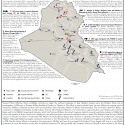 |
 |
Iraq Situation Report: October 4-11, 2016

Former Prime Minister Nouri al-Maliki continues to shape the political landscape in Iraq. Maliki’s shadow party, the Reform Front, led an interrogation of Minister of Foreign Affairs Ibrahim al-Jaafari on October 6. The effort to remove Jaafari from his post follows an ongoing process steered by Maliki to eliminate his key rivals and undermine Prime Minister Haidar al-Abadi’s administration. The successful removal of Jaafari, a competitor to Maliki’s premiership, would indicate that the Shi’a National Alliance is too fractured to support Jaafari, a pro-Iranian and consensus figure, and to foil Maliki’s targeting of ministers, which the National Alliance has stated it opposes. Jaafari’s removal would also indicate to Maliki that he has the numbers to drive a vote of no confidence in the prime minister, a position he ultimately aims to retake. The Federal Court also gave Maliki a boost on October 10 when it overturned PM Abadi’s unconstitutional August 2015 decision to eliminate the three vice presidencies, including Maliki’s. Although Maliki has largely continued to function as Vice President, the court’s decision will add to his legitimacy and deals a serious blow to PM Abadi’s reform efforts to streamline the government. Maliki may have also prompted the Federal Court, largely still seen as a pro-Maliki institution, to issue the decision at this time for political purposes. The ruling notably also reinstates Osama al-Nujaifi, a senior leader in the Sunni political alliance. In return, Maliki may call for Sunni political support either for pro-Maliki ministerial candidates or for a future bid for the premiership.
Turkish President Recep Erdogan and PM Abadi traded bombastic rhetoric over Turkish force presence northeast of Mosul. Turkey renewed its one-year force mandate on October 1, reviving ongoing complaints by Iraqi officials against Turkey’s violation of Iraqi sovereignty. Erdogan’s hostile comments against Iraq and PM Abadi on October 11, however, are part of a greater trend by Erdogan to posture Turkey as having a right to influence any decision made about northern Iraq. Erdogan went as far as to give the date for operations to begin in Mosul during an interview on September 25, pre-dating the argument over Turkey’s force renewal on October 1. Erdogan’s over-the-top statements do not yet indicate that Turkey will increase its presence in northern Iraq, where they are currently training Sunni forces to retake and hold Mosul. His firm rhetoric does, however, suggest that he is reserving Turkey’s right to operate in northern Iraq, primarily to counter the expansion of Kurdistan Workers’ Party (PKK) on the Turkish-Iraqi border and prevent them from participating in Mosul operations.